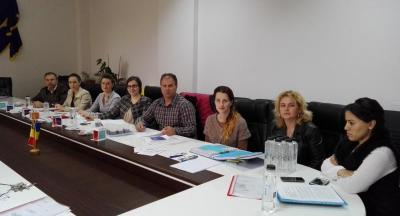Ivesti
*Disclaimer: The information and views set out in this page do not necessarily reflect the official opinion of the Council of Europe and/or the European Commission. Neither the Council of Europe, the European Commission nor any person acting on their behalf may be held responsible for the use which may be made of the information contained therein.
Last update: 03/10/2016
IIvești is in Galați County with a total population is of 10,225 inhabitants and 3,027 households. The 2011 census records for Ivești show that 20% of the total population is Roma, 75% are Romanians and 5% are other national minorities (Greek, Turkish, Serbian and Bulgarian). Only 48% of the total population has a steady job, with most of the employment opportunities for the area in agriculture, manufacturing, trade and construction.
Roma living in Ivești are concentrated in Amilcar Vasiliu and Blajerii de sus, they are also in other areas of the village. Most of the issues faced by Roma in the municipality are in are in education, health, housing and employment. The community faces high drop-out rates, a lack of proper health diagnosis and treatment as well as a scarcity of jobs. Most Roma find employment in agriculture as seasonal labour. The lack of financial means combined with poor access to services represents the root causes of the issues mentioned above.
Poor housing is one of the highest risks faced by the Roma community in Ivești, the major areas in which they live are susceptible to flooding. In the aftermath of a flood in 2005, a number of houses were destroyed and they remain in the same poor conditions due to the lack of resources necessary for the repairs. Many of the Roma houses lack electricity, sewerage and access to mains running water. Many families also do not own property documents for their dwelling. Added to these challenges is the poor conditions of the roads to the communities as many are not paved.
The ROMACT Process
With the signature of the Letter of Commitment in 2015, Ivești joined the ROMACT programme.
Shortly after the signing, the Local Council approved the creation of a Taskforce for Roma Inclusion and a Community Action Group (CAG) was created and they prioritized the needs of the community. The CAG and the local authority representatives worked together on the priorities and included the measures in the Local Action Plan. The tables below summarize some of the most important short-term and long-term needs of the community:
| Short-term priorities | Objective 1 | Objective 2 | Objective 3 |
|---|---|---|---|
| Education | Continuation of School after School program | Implementation of literacy programs in order to address pupils who dropped-out of school | Implementation of multicultural projects within the community in order to stimulate interethnic collaboration |
| Youth | Active participation of youth in the community's life | ||
| Housing | Rehabilitation of the houses in the Roma community | ||
| Infrastructure | Access to the running water network | Pavement/asphalting of the roads in the Roma community | Building a playground for children and a sports center |
| Long-term priorities | Objective 1 | Objective 2 | Objective 3 |
|---|---|---|---|
| Employment | Creating employment opportunities | ||
| Health | Provide equipment for a medical center and hire medical staff | ||
| Infrastructure | Sewarage network in the community | Connecting the Roma houses to the electricity network | Providing land plots for young families to build houses |
In December 2015, Ivești received funding through the National Rural Development Programme (PNDR) and planned to implement activities involving the Roma community, namely a cultural festival and the "School after School programme".
Another project that taking place in Ivești is “Learning English Through I.C.T.”, a transnational project which targets the development of English language skills for students through the Erasmus+, KA2 programme.
The Municipality benefited of ROMACT expertise for the following project:
* ”Tineri ROMACTivi” , Erasmus+, KA3
Status: rejected

